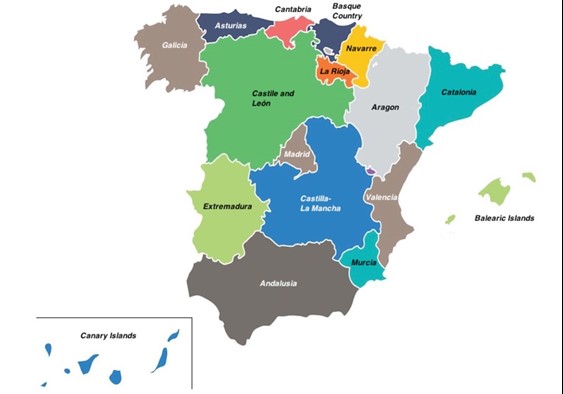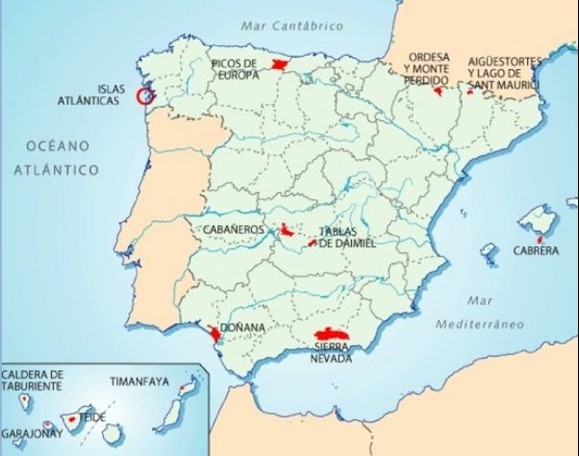Trekking tours in Spain
Trips in Spain
An adventure holiday in Spain is a chance to discover marvellous landscapes full of contrasts. Its famous wine, its ancestral music, its fantastic food, its wonderful people… From North to South and on its islands, Spain always offers the possibility to enjoy trekking in natural paradise with beautiful mountains to climb.
Take some days to rest, go hiking, swim in crystal clear water with the perfect weather and, of course, get familiar with the traditional culture of a country and one of the most valued gastronomies in the whole world. You can live all these adventures in the same region! All year long, Spain is a trip to enjoy, an experience to learn, a country to come back to again and again.
Key Facts
Capital Madrid
Government Democratic monarchy
Population ~ 46 million
Area 505,000 sq km
Highest peaks 1st Teide (3718m), 2nd Mulacén (3482m)
Currency Euro (€)
Language Spanish and official regional dialects.
Gastronomy Paella, jamón ibérico, tortilla de patata
Weather Spain has a wide variety of climates, please see World Climate Travel
Water You can drink the tap water almost everywhere
Tapas You can expect a free bite with your drink in lot of places
Airports
Mainly for our trips: Madrid-Barajas, Santiago de Compostela (Galicia), Oviedo (Asturias), Santander (Cantabria), Tenerife (Islas Canarias) y Granada (Andalucía).
Medical Emergencies
Emergency treatment and medical assistance is free or discounted to citizens of the European Union, Switzerland, Norway, Iceland and Liechtenstein whilst in Europe as long as you have a European Health Insurance Card (post Brexit these are still valid). If, or when your EHIC card expires, you should replace it with the new GHIC (Global Health Insurance Card), which still offers you the right to access state-provided healthcare during a temporary stay in the European Union (EU). You can order your GHIC online by clicking here - please be aware that your application is FREE - there are lot's of sites that offer to process this for you for a fee, but this is not required and it is a quick and easy process. We do also recommend travelling with international medical insurance.
Celiac and gluten free diets
There are many hotels and restaurants which cater for people with celiac disease, but this cannot be guaranteed in more remote places like mountain lodges. Please contact us in advance if you would like to discuss specific needs and we can find out what is available.
Money and tips
Most towns and villages will have ATMs to withdraw cash, and most places like hotels and restaurants will accept cash in euros or payment by card. Debit cards from the UK or Ireland will not work, so you will need to use a credit card which can be expensive. We would recommend either cash or a travellers card which you can preload.
Tips are welcome in bars and restaurants, hotels and taxis and the amount is normally 5%-10% of the bill total. However many establishments charge a service fee anyway, in which case a tip would not be obligatory.
Connections
Most places will have wifi which is free but if you are using your mobile network then check in advance if there is roaming charge for data or even for calls, this may well be the case for UK citizens after Brexit. A good option would be a prepaid SIM card.
Electrical sockets are 220V 50Hz and use the standard European round pin system. Most hotels have adapters but it's a good idea to bring your own in case.
The international code for Spain is +34.
The emergency number in Spain is 112.
Another online way of calling the police in Spain which is available in English is through an app called AlertCops.
Driving
Driving is on the right hand side and the vast majority of road rules are the same as in the UK and Ireland. Most roads are toll free but some motorways do have tolls (autopistas) but there is always a free alternative. A UK driving license is accepted but this may not be the case after Brexit, in which case an International Driving License will be needed.
Times
Spain is in the UTC +1 time zone.
During the year, the clocks change twice, for summer and winter. The first change is the last weekend in March when the clocks go forward an hour. The second change is the last weekend in October when the clocks go back an hour.
National Holidays
1 January, New Year's Day.
6 January, Epiphany.
9 April, Maundy Thursday (throughout Spain, except in Catalonia and Cantabria).
10 April, Good Friday.
1 May, Labour Day.
15 August, the Assumption.
12 October: Spain's National Day.
1 November, All Saints' Day.
6 December, Spanish Constitution Day.
8 December, Festivity of the Inmaculada Concepción.
25 December, Christmas Day.
Opening Hours
- Breakfast is normally served between 7am and midday.
- Between midday and 2pm it is typical to go for a drink or have some tapas with friends.
- Restaurants tend to serve lunch between 1 pm and 4 pm and dinner between 8 pm and 10.30 pm. In big cities and during the summer it is normal for dinner to be served till 11.30 pm.
- The normal check-in time for hotels tends to start at 2pm and check-out times end at midday.
- The norm is for shops to open continuously from 10 am to 9 pm. At times, they close between 2 pm and 5 pm, especially in summer.
- Theatre productions, concerts and shows tend to start between 8 pm and 9 pm. In summer, starting times can be later, even as late as 10 pm or 11 pm.
- Public buses in big cities tend to run between 6 am and 11 pm, and the Metro tends to open later. Between 11.30 pm and 6 am, there is usually a night service.
- Sunday is the normal day for shops and businesses to close.
Map of Regions in Spain

National Parks in Spain


